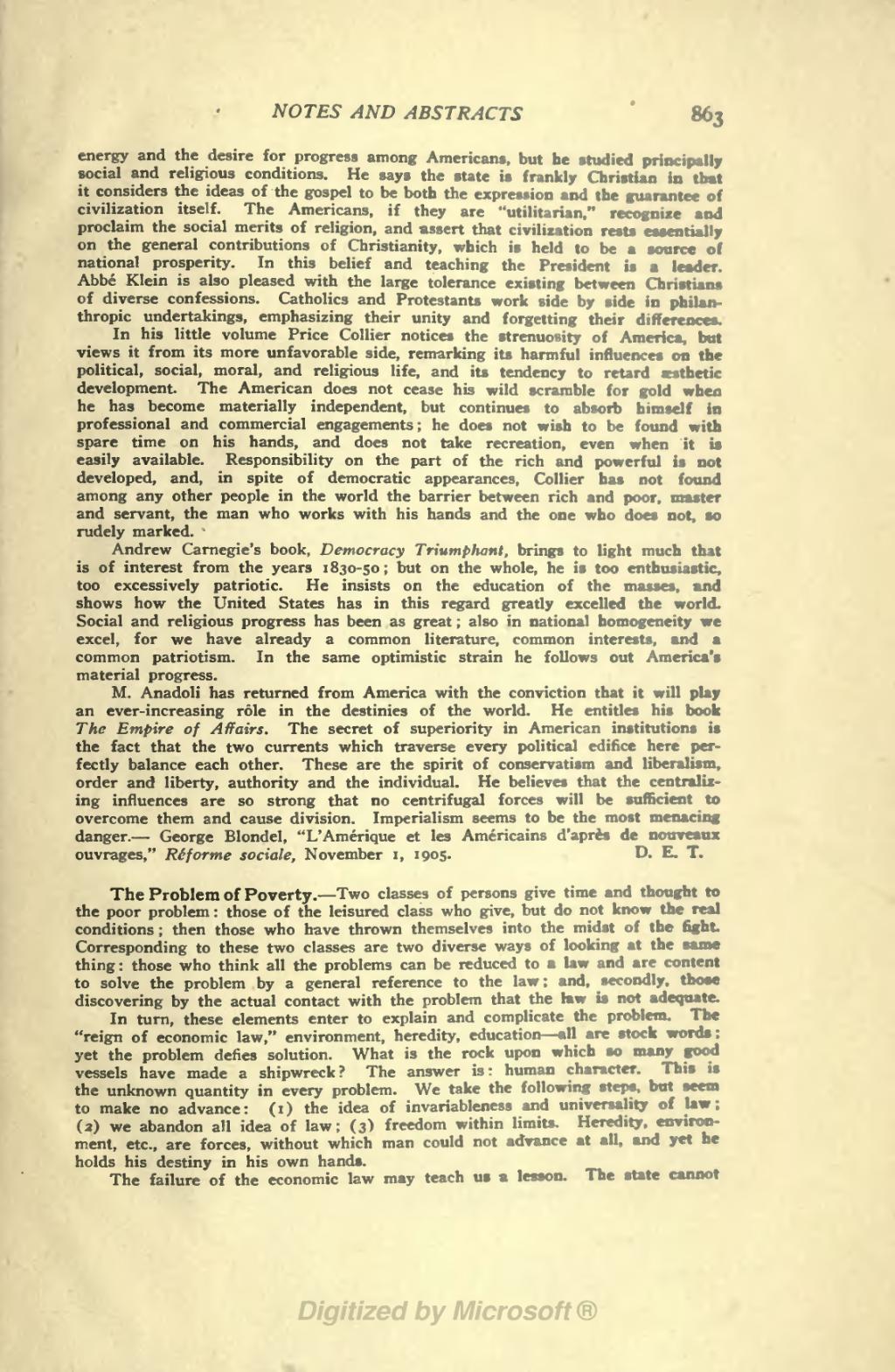NOTES AND ABSTRACTS 863
energy and the desire for progress among Americans, but he studied principally social and religious conditions. He says the state is frankly Christian in that it considers the ideas of the gospel to be both the expression and the guarantee of civilization itself. The Americans, if they are "utilitarian," recognize anJ proclaim the social merits of religion, and assert that civilization rests essentially on the general contributions of Christianity, which is held to be a source of national prosperity. In this belief and teaching the President is a leader. Abbe Klein is also pleased with the large tolerance existing between Christians of diverse confessions. Catholics and Protestants work side by side in philan- thropic undertakings, emphasizing their unity and forgetting their differences.
In his little volume Price Collier notices the strenuosity of America, but views it from its more unfavorable side, remarking its harmful influences on the political, social, moral, and religious life, and its tendency to retard esthetic development. The American does not cease his wild scramble for gold when he has become materially independent, but continues to absorb himself in professional and commercial engagements ; he does not wish to be found with spare time on his hands, and does not take recreation, even when it is easily available. Responsibility on the part of the rich and powerful is not developed, and, in spite of democratic appearances, Collier has not found among any other people in the world the barrier between rich and poor, master and servant, the man who works with his hands and the one who does not, so rudely marked.
Andrew Carnegie's book, Democracy Triumphant, brings to light much that is of interest from the years 1830-50; but on the whole, he is too enthusiastic, too excessively patriotic. He insists on the education of the masses, and shows how the United States has in this regard greatly excelled the world. Social and religious progress has been as great ; also in national homogeneity we excel, for we have already a common literature, common interests, and a common patriotism. In the same optimistic strain he follows out America's material progress.
M. Anadoli has returned from America with the conviction that it will play an ever-increasing role in the destinies of the world. He entitles his book The Empire of Affairs. The secret of superiority in American institutions is the fact that the two currents which traverse every political edifice here per- fectly balance each other. These are the spirit of conservatism and liberalism, order and liberty, authority and the individual. He believes that the centraliz- ing influences are so strong that no centrifugal forces will be sufficient to overcome them and cause division. Imperialism seems to be the most menacing danger. George Blondel, "L'Amerique et les Americains d'apres de nouveaux ouvrages," Re forme sociale, November i, 1905.
The Problem of Poverty. Two classes of persons give time and thought to the poor problem : those of the leisured class who give, but do not know the real conditions ; then those who have thrown themselves into the midst of the fight. Corresponding to these two classes are two diverse ways of looking at the same thing: those who think all the problems can be reduced to a law and are content to solve the problem by a general reference to the law ; and, secondly, those discovering by the actual contact with the problem that the tow is not adequate.
In turn, these elements enter to explain and complicate the problem. The "reign of economic law," environment, heredity, education all are stock words : yet the problem defies solution. What is the rock upon which so many good vessels have made a shipwreck? The answer is: human character. This i the unknown quantity in every problem. We take the following steps, but seem to make no advance: (i) the idea of in variableness and universality of law; (2) we abandon all idea of law; (3) freedom within limits. Heredity, environ- ment, etc., are forces, without which man could not advance at all, and yet he holds his destiny in his own hands.
The failure of the economic law may teach us a lesson. The state cannot
